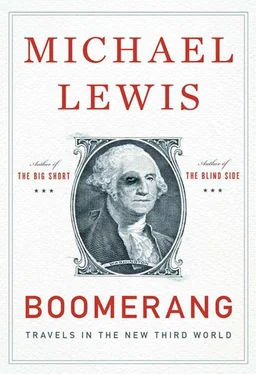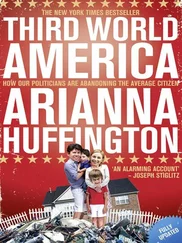Three hours later, in the car on the way back to Athens, my cell phone rings. It’s Father Matthew. He wants to ask me a favor. Oh no , I think, they’ve figured out what I’m up to and he’s calling to place all sorts of restrictions on what I write . They had, sort of, but he didn’t. The minister of finance insisted on checking his quotes, but the monks just let me run with whatever I had, which is sort of amazing, given the scope of the lawsuits they face. “We have been reading this adviser in the American stock market,” says the monk. “His name is Robert Chapman . . . ” (I’d never heard of him. He turned out to be the writer of a newsletter about global finance.) His fellow monks, said Father Matthew, were wondering what I thought of Robert Chapman. Whether he was worth listening to . . .
THE DAY BEFORE I left Greece the Greek parliament debated and voted on a bill to raise the retirement age, reduce government pensions, and otherwise reduce the spoils of public-sector life. (“I’m all for reducing the number of public-sector employees,” an IMF investigator had said to me. “But how do you do that if you don’t know how many there are to start with?”) Prime Minister Papandreou presented this bill, as he has presented everything since he discovered the hole in the books, not as his own idea but as a nonnegotiable demand of the IMF’s. The general idea seems to be that while the Greek people will never listen to any internal call for sacrifice they might listen to calls from outside. That is, they no longer really even want to govern themselves.
Thousands upon thousands of government employees take to the streets to protest the bill. Here is Greece’s version of the Tea Party: tax collectors on the take, public-school teachers who don’t really teach, well-paid employees of bankrupt state railroads whose trains never run on time, state hospital workers bribed to buy overpriced supplies. Here they are, and here we are: a nation of people looking for anyone to blame but themselves. The Greek public-sector employees assemble themselves into units that resemble army platoons. In the middle of each unit are two or three rows of young men wielding truncheons disguised as flagpoles. Ski masks and gas masks dangle from their belts so that they can still fight after the inevitable tear gas. “The deputy prime minister has told us that they are looking to have at least one death,” a prominent former Greek minister had told me. “They want some blood.” Two months earlier, on May 5, during the first of these protest marches, the mob offered a glimpse of what it was capable of. Seeing people working at a branch of the Marfin Bank, young men hurled Molotov cocktails inside and tossed gasoline on top of the flames, barring the exit. Most of the Marfin Bank’s employees escaped from the roof, but the fire killed three workers, including a young woman four months pregnant. As they died, Greeks in the streets screamed at them that it served them right, for having the audacity to work. The events took place in full view of the Greek police, and yet the police made no arrests.
As on other days, the protesters have effectively shut down the country. The air-traffic controllers have also gone on strike and closed the airport. At the port of Piraeus, the mob prevents cruise-ship passengers from going ashore and shopping. At the height of the tourist season the tourist dollars this place so desperately needs are effectively blocked from getting into the country. Any private-sector employee who does not skip work in sympathy is in danger. All over Athens shops and restaurants close; so, for that matter, does the Acropolis.
The lead group assembles in the middle of a wide boulevard a few yards from the burned and gutted bank branch. That they burned a bank is, under the circumstances, incredible. If there were any justice in the world the Greek bankers would be in the streets marching to protest the morals of the ordinary Greek citizen. The Marfin Bank’s marble stoop has been turned into a sad shrine: a stack of stuffed animals for the unborn child, a few pictures of monks, a sign with a quote from the ancient orator Isocrates: “Democracy destroys itself because it abuses its right to freedom and equality. Because it teaches its citizens to consider audacity as a right, lawlessness as a freedom, abrasive speech as equality, and anarchy as progress.” At the other end of the street a phalanx of riot police stand, shields together, like Spartan warriors. Behind them is the Parliament building; inside, the debate presumably rages, though what is being said and done is a mystery, as the Greek journalists aren’t working, either. The crowd begins to chant and march toward the vastly outnumbered police: the police stiffen. It’s one of those moments when it feels as if anything might happen. Really, it’s just a question of which way people jump.
That’s how it feels in the financial markets, too. The question everyone wants an answer to is: Will Greece default? There’s a school of thought that says they have no choice: the very measures the government imposes to cut costs and raise revenues will cause what is left of the productive economy to flee the country. The taxes are lower in Bulgaria, the workers more pliable in Romania. But there’s a second, more interesting, question: Even if it is technically possible for these people to repay their debts, live within their means, and return to good standing inside the European Union, do they have the inner resources to do it? Or have they so lost their ability to feel connected to anything outside their small worlds that they would rather just shed the obligations? On the face of it, defaulting on their debts and walking away would seem a mad act: all Greek banks would instantly go bankrupt, the country would have no ability to pay for the many necessities it imports (oil, for instance), and the government would be punished for many years in the form of much higher interest rates, if and when it was allowed to borrow again. But the place does not behave as a collective; it lacks the monks’ instincts. It behaves as a collection of atomized particles, each of which has grown accustomed to pursuing its own interest at the expense of the common good. There’s no question that the government is resolved to at least try to re-create Greek civic life. The only question is: Can such a thing, once lost, ever be re-created?
III

IRELAND’S ORIGINAL SIN
When I flew to Dublin in early November 2010 the Irish government was busy helping the Irish people come to terms with their loss. It had been two years since a handful of Irish politicians and bankers had decided to guarantee all the debts of the biggest Irish banks, but the people were only now getting their minds around what that meant for them. The numbers were breathtaking. A single bank, Anglo Irish, which, two years before, the Irish government claimed was suffering from a “liquidity problem,” confessed to losses of 34 billion euros. To get a sense of how “34 billion euros” sounds to Irish ears, an American thinking in dollars needs to multiply it by roughly one hundred: $3.4 trillion. And that was for a single bank . As the sum total of loans made by Anglo Irish Bank, most of it to Irish property developers, was only 72 billion euros, the bank had lost nearly half of every dollar it invested.
The two other big Irish banks, Bank of Ireland and, especially, Allied Irish Banks (AIB), remained Ireland’s dirty little secret. Both older than Ireland itself (the Bank of Ireland was founded in 1783; Allied Irish was formed in a merger of three banks founded in the 1800s), both were now also obviously bust. The Irish government owned most of the two ancient banks, but revealed less about them than they had about Anglo Irish. As they had lent vast sums not only to Irish property developers but also to Irish home buyers, their losses were obviously vast—and similar in spirit to the losses at the upstart Anglo Irish. Even in an era when capitalists went out of their way to destroy capitalism, the Irish bankers had set some kind of record for destruction. Theo Phanos, whose London hedge fund has interests in Ireland, says that “Anglo Irish was probably the world’s worst bank. Even worse than the Icelandic banks.”
Читать дальше













